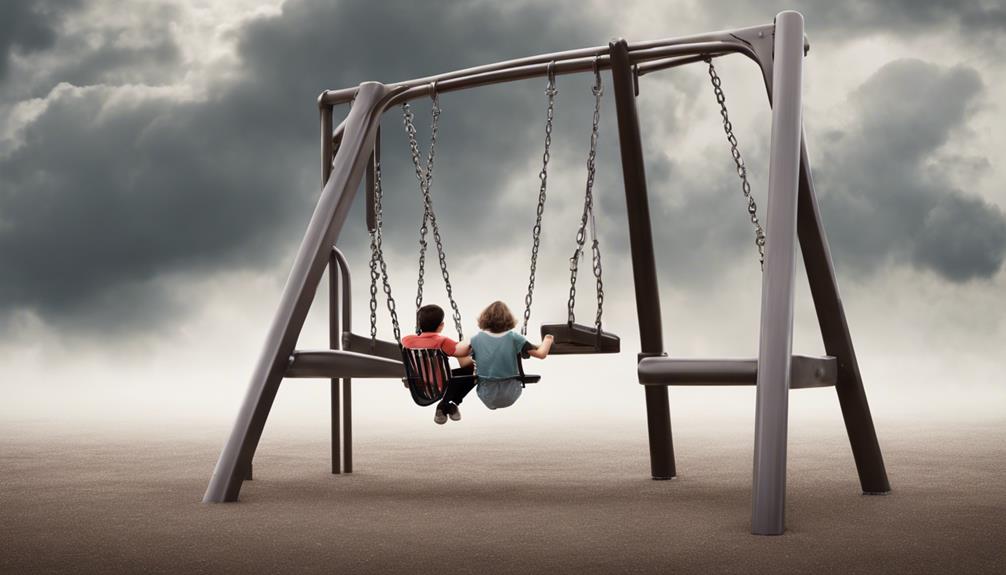As we explore the intricacies surrounding the impacts of divorce on adult children, it is evident that these individuals go through a variety of emotions that are often disregarded or downplayed.
The aftermath of divorce can leave lasting scars on adult children, affecting not just their present relationships but also their sense of self and belonging.
Understanding these emotional effects is essential in order to offer meaningful support and guidance to those grappling with the complexities that arise from their parents' separation.
Key Takeaways
- Adult children face abandonment and confusion post-divorce.
- Trust issues and emotional challenges are common.
- Communication, self-care, and boundaries aid resilience.
- Supportive environments and open conversations facilitate healing.
Emotional Impact on Adult Children
Experiencing the emotional turbulence of their parents' divorce, adult children often find themselves grappling with feelings of abandonment and confusion. The impact of this significant life event can be profound, affecting not only their emotional well-being but also their approach to family dynamics and relationships.
As adult children navigate the aftermath of their parents' divorce, they may struggle with accepting new partners or changes in family gatherings. The once familiar and comforting traditions of traditional family events may now feel disrupted, adding to their feelings of abandonment and confusion.
It is crucial for adult children to acknowledge and address these complex emotions openly. By recognizing the emotional impact of their parents' divorce, they can begin the healing process and seek support when needed.
While it may be challenging to adapt to the changes brought about by divorce, understanding that these feelings are valid and seeking ways to cope can help adult children navigate this difficult period with resilience and strength.
Challenges Faced by Adult Children

Facing the challenges brought on by their parents' divorce, adult children often grapple with a range of complex emotions and uncertainties. The divorce impact on adult children can lead to deep-seated trust issues, especially towards their parents, which can significantly impact their relationships.
Emotional challenges, like feelings of abandonment and being adrift, are common among adult children of divorce, yet these struggles aren't always openly addressed. Navigating family events post-divorce can be laden with tension, making it stressful for adult children, as they try to navigate the complexities of altered family dynamics.
Adjusting to changes such as parental remarriage can present further difficulties for adult children, as they strive to find their place within shifting family structures. In the midst of these challenges, adult children may find themselves wrestling with their parental relationships and the nuances of family life, underscoring the complexity of their struggles in the aftermath of divorce.
Coping Strategies for Adult Children
Navigating the emotional aftermath of their parents' divorce, adult children can find solace and resilience through practical coping strategies that prioritize communication and self-care. Maintaining open communication with both parents is key in addressing the emotional challenges that arise from divorce. Setting boundaries when it comes to legal proceedings can help adult children protect their emotional well-being during this turbulent time.
Seeking support from friends, family, or a therapist is crucial for processing feelings and emotions effectively. It's essential to focus on self-care and establish healthy boundaries to navigate the emotional struggles that come with divorce. By communicating concerns calmly and openly, without judgment, adult children can better cope with the impact of their parents' divorce. Remember, taking care of yourself and reaching out for support are vital steps in the healing process.
Support for Adult Children of Divorce

Understanding the challenges faced by adult children of divorce is essential in providing them with the necessary support for healing and growth. It's crucial to acknowledge the emotional impact of divorce on adult children and offer them the support they need to navigate through this difficult time.
Here are some key ways to support adult children of divorce:
- Offer Emotional Support: Adult children often carry unresolved issues from their parents' divorce. Providing a safe space for them to express their feelings can aid in their healing process.
- Assist with Relationship Commitment: Struggles with commitment in relationships are common among adult children of divorce. Encouraging healthy relationship behaviors and communication can help them overcome these challenges.
- Seek Professional Guidance: Professional therapists or counselors can offer valuable insights and strategies to help adult children work through the emotional baggage left by their parents' divorce.
- Promote Open Dialogue and Awareness: Encouraging open conversations and raising awareness about the impact of divorce can empower adult children to confront and transcend the effects of their parents' separation.
Navigating Family Dynamics After Divorce
Adjusting to the shifting dynamics within a family post-divorce can present unique challenges for adult children as they navigate through the complexities of new relationships and interactions. As adult children of divorced parents, we may find ourselves grappling with conflicting emotions and uncertainties when family gatherings bring both parents together. Memories of happier times can intertwine with present tensions, making these occasions emotionally charged. The presence of grandchildren can add another layer of complexity, potentially becoming a point of contention between divorced grandparents.
Furthermore, the strain of witnessing our parents not getting along during family events can take a toll on our emotional well-being. The introduction of new family members, such as step-siblings or new partners, can also pose challenges as we strive to adjust to unfamiliar dynamics. It's crucial for us to seek emotional support and open communication within our family unit to navigate these post-divorce complexities with understanding and compassion. Remember, it's okay to set boundaries and prioritize our own mental and emotional health amidst these challenging family dynamics.
Frequently Asked Questions
How Does Divorce Affect Adult Children Psychologically?
Divorce can deeply impact adult children psychologically, causing feelings of abandonment, confusion, and pressure to choose sides. We may struggle with relationships, family changes, and new dynamics. Support and understanding are crucial during this turbulent time.
What Age Is Most Affected by a Parents Divorce?
We feel like a rollercoaster, with emotions soaring and plunging. The age group most affected by a parent's divorce is typically 18 to 29. It's a time of significant challenges and adjustments for us adult children.
Why Is My Parents Divorce Affecting Me Years Later?
It's normal to feel the lasting effects of your parents' divorce years later. We understand how that can impact your emotional well-being. Remember, it's okay to seek support and work through these feelings at your own pace.
What to Do When Your Parents Are Divorcing as an Adult?
We understand the pain of navigating our parents' divorce as adults. Seek support, set boundaries, prioritize self-care. Remember, it's okay to feel and seek help. Communication, therapy, and time can aid healing.
Conclusion
As adult children of divorce, we must acknowledge the emotional toll it can take on us. It's essential to recognize our challenges, find effective coping strategies, and seek support when needed.
Navigating family dynamics post-divorce may be tough, but with resilience and understanding, we can overcome.
Let's remember that our experiences are valid, and we aren't alone in this journey towards healing and growth. Together, we can navigate this difficult path with strength and compassion.










